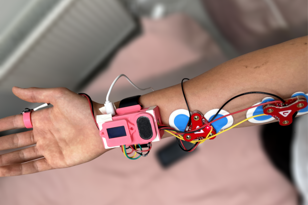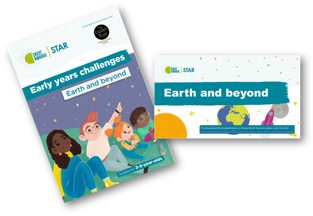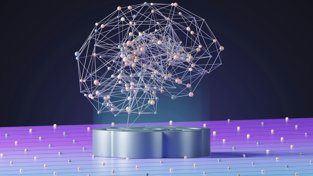Posted:
11 November 2025
Gold CREST Award case study: using machine learning to aid communication

It started because I was thinking about a family member who has cerebral palsy. I was thinking about devices I could build for this CREST project that could have…some positive impact on a person’s life.
This is Tom, a 17 year old secondary school student speaking to us about the project for which he earned CREST Gold Award, ‘Designing a tool to help deaf and mute people communicate more easily’.
Employing an impressive array of skills, coupled with his interest in making communication more inclusive, Tom built a working device which, when worn on the user’s arm, and can translate the British Sign Language (BSL) alphabet into written words and audio.
This is a remarkable accomplishment, although Tom humbly tells us “It seems a lot more impressive that it is.” (we beg to differ!). He used complex techniques involving muscles sensors, machine learning, coding and 3D printing to build his device.
With plans to study engineering at university when he finishes his A-levels, Tom told us his Gold Award was a great achievement to include in his UCAS personal statement. In fact, he found about CREST when looking for a super-curricular activity to demonstrate his aptitude for engineering to university admissions boards.
We chatted to Tom to hear about what inspired him, the skills he used and developed, and his future career ambitions.
“The problems disabled people face don’t necessarily always come from their disabilities”
Tom explained that seeing the experiences of his family member with cerebral palsy prompted him to think about how important communication is to quality of life, and how increasingly advanced technology could be harnessed to help disabled people. His research, he told us, shed more light on why we need to become more inclusive.
I saw a quote when I was doing my research and it was saying that the problems disabled people face don’t necessarily always come from their disabilities, but more from barriers in society.
Keen to make his device as user-friendly and barrier-free as possible, Tom designed it in such a way that the hand is kept free; most of the apparatus goes on the arm.
The idea being you could still use your hand, rather than having to wear a big glove that is going to restrict mobility.
Tom kindly demonstrated how one can use this device in a video:
“I’d never read any academic papers before…so it was a skill in itself”
Tom’s CREST project required a lot of in-depth research, which gave him the opportunity to develop skills that will no doubt be useful in the future.
I’d never read any academic papers before doing this project, so it was a skill in itself, learning how to look at academic papers and read them take the information that you want.
Keeping a record of all his research to include in the final report was “definitely one the newest parts for me”, Tom said.
As Gold projects are so complex (they require around 70 hours work), and can often involve students doing work they might not have done before, we recommend students find a mentor. Tom’s mentor was Nefeli Hutton, a Graduate Mechanical Design Engineer at the Science and Technology Facilities Council. She was enormously helpful, Tom told us, particularly at the research stage.
[Nefeli] helped me so much during the project with all this research and helping me format my work and making sure I was documenting everything.
“Staying persistent, being determined and just keep going”
As well as research, building the device itself allowed Tom to gain new skills and more experience with techniques he was already familiar with. He taught himself coding during the COVID-19 lockdowns, he explained, “so that wasn’t too alien to me”, and while he hadn’t used Raspberry Pi before, he had “used similar microcontrollers and single board computers”.
3D printing however, a technique he used to make the case to house the Raspberry Pi device that sits on the wrist, was new.
I’d never done any 3D printing before so I borrowed a 3D printer from a friend and I was learning how to use it which was really fun, it’s definitely really interesting.
Working with this type of technology will inevitably throw up issues that can be frustrating to solve. Tom found that there is a lot of help out there in online tutorials and communities who can offer their experience.
Finding people online talking about the same problem and talking about how to fix it was definitely helpful.
Tom said that with so much help available, anyone should empowered to get creative with technology.
I think people will be surprised what they could make or do, even if something seems really challenging, staying persistent, being determined and just keep going.
“It definitely improved my writing and explaining my thought process”
To earn a Gold CREST Award, students must submit a detailed report outlining their plans and each step the process – a mammoth task but one that will set Tom in good stead in the future.
“In some ways [writing the report] was probably the biggest challenge”, he said, “because getting everything I wanted to say and doing it in the right way that’s required for CREST Gold Award was quite tough.”
Tackling tough challenges can often yield high rewards, as Tom found.
It definitely improved my writing and explaining my thought process and what I was doing with each step.
He continued:
I’m looking into engineering next and I think it’s definitely important to be able to clearly get your ideas across.
“I’d love to go into something to do with robotics”
At just 17 years old, Tom has applied his outstanding STEM skills to create a device that, with some honing and refining, could make a real difference.
Is this the direction he hopes his future career will take?
“I’m really interested in robotics, I’d love to go into something to do with robotics. This is definitely not dissimilar to robotics and machine learning. If a lot more research and time and effort and money goes into developing this kind of technology it could be really useful to people. I think that’s the kind the work I’d like to do when I’m older.”


